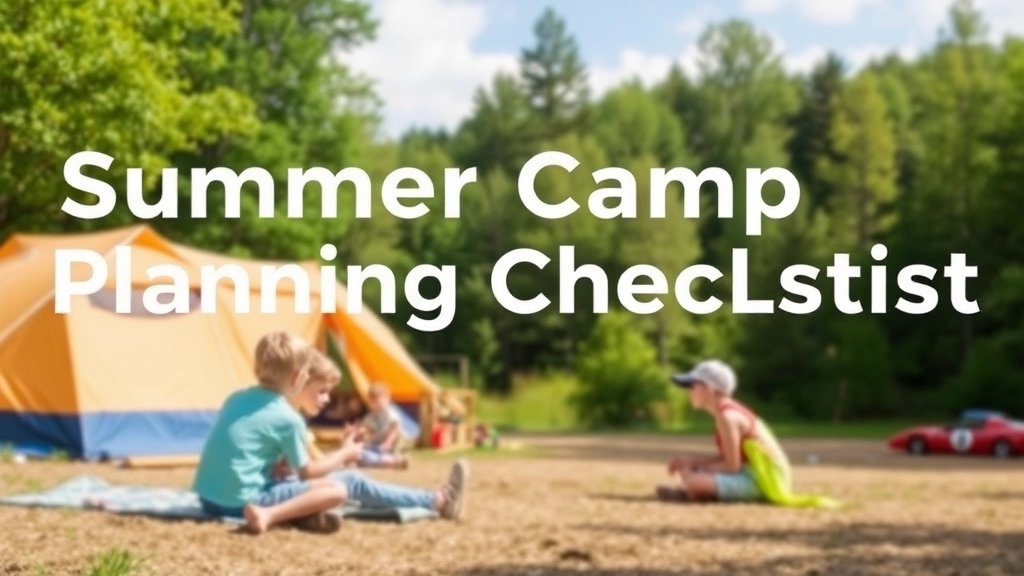Planning for a Summer Camp
Planning for a summer camp can be both exciting and overwhelming. Whether you’re a parent or a camp organiser, having a comprehensive Summer Camp Planning Checklist is crucial. From choosing the right camp to ensuring your child is emotionally prepared, this guide covers all the essential steps to make the process smooth and stress-free.
Selecting the Ideal Camp
Start by selecting the ideal camp that aligns with your child’s interests and needs. Early registration is key to securing a spot, so keep an eye on deadlines. Don’t forget to prioritise health and safety preparations, including necessary medical forms and emergency contacts.
Packing Checklist
An essential packing checklist will ensure nothing important is left behind, while emotional preparation will help your child feel ready for the adventure ahead.
Choosing the Right Summer Camp
Alright, let’s dive into the nitty-gritty of choosing the right summer camp. This is a big deal, right? You want to make sure your kid has the time of their life while staying safe and learning something new. But where do you even start?
Real Questions Parents Ask
- “How do I know if this camp is safe?”
- “Will my child make friends?”
- “What if they get homesick?”
- “Is it worth the money?”
These are all valid concerns, and I’ve got your back. Let’s break it down.
Types of Summer Camps
First things first, there are different types of camps out there. Knowing what fits your child best can make a world of difference.
Day Camps vs. Overnight Camps
- Day Camps: Great for younger kids or first-timers. They get to enjoy camp activities during the day and come home at night.
- Overnight Camps: Perfect for older kids who are ready for a bit more independence. These camps offer a full immersion experience.
Specialised Camps
- Sports Camps: For the budding athlete. Whether it’s football, basketball, or gymnastics, there’s a camp for it.
- Art Camps: If your child loves painting, acting, or music, these camps can nurture their creative side.
- Academic Camps: Think science, coding, or even space camps. Perfect for the little Einsteins.
What to Look for in a Camp
Now, let’s talk about the nitty-gritty details. Here are some key factors to consider:
Safety First
- Accreditation: Look for camps accredited by the British Activity Providers Association (BAPA) or similar organisations.
- Staff Training: Ensure the staff are trained in first aid and child protection.
- Health Protocols: Especially important in today’s world. Check their protocols for illness, allergies, and emergencies.
Camp Activities
- Variety: A good camp offers a mix of activities. You want your child to try new things and not get bored.
- Skill Levels: Make sure the activities are suitable for your child’s age and skill level.
Camp Culture
- Values: Does the camp promote values that align with yours? This can be anything from teamwork to environmental stewardship.
- Inclusion: Look for camps that celebrate diversity and make every child feel welcome.
Real-Life Example
I remember when I was a kid, my parents sent me to a sports camp. I was nervous, but the camp counsellors were so welcoming that I made friends on the first day. We played football, went hiking, and even had a talent show. That experience boosted my confidence and gave me memories I’ll never forget.
Final Thoughts
Choosing the right summer camp can feel overwhelming, but it doesn’t have to be. Focus on what matters most: safety, activities, and culture. Do your research, ask questions, and trust your gut. Your child is in for an unforgettable experience.
For more information on specific camps, check out our Top Summer Running Camps for Youth Athletes or our Volleyball Summer Camps: 2024 Top Picks & Benefits guides.
Early Registration and Deadlines
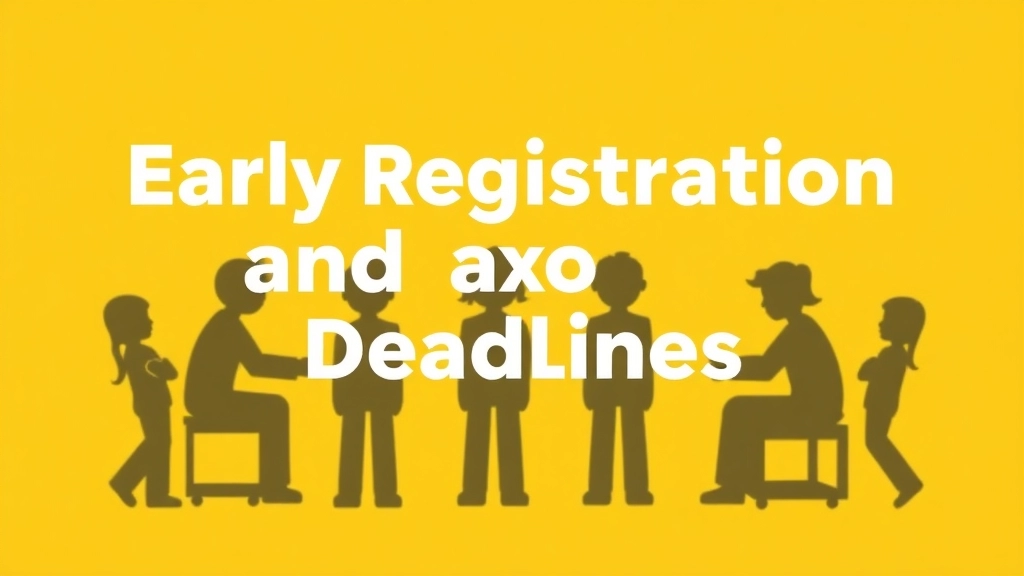
Ever wondered why summer camp registration feels like a race against time?
Early registration is your golden ticket to securing a spot in the best camps.
But why rush?
Simple. Deadlines.
Miss them, and you might miss out.
Let’s break it down:
Why Register Early?
- Best Choices: Top camps fill up fast.
- Discounts: Early birds often snag lower rates.
- Peace of Mind: Less stress closer to summer.
Common Worries
- “What if my child doesn’t like it?”
- “What if our plans change?”
- “What if I miss the deadline?”
Solutions
- Flexible Policies: Many camps offer refunds or transfers.
- Plan Ahead: Think about your summer plans now.
- Set Reminders: Use your phone or calendar to track deadlines.
Real Talk
I once missed the deadline for a top camp.
My kid ended up at a second-choice camp.
Not the end of the world, but why settle?
Pro Tips
- Research Early: Start looking at camps in the winter.
- Create a Shortlist: Narrow down your top choices.
- Check Reviews: Look at what other parents say.
- Contact Camps: Ask about deadlines and policies.
Health and Safety Preparations
Alright, let’s dive into the nitty-gritty of health and safety preparations for summer camp. This is the stuff that keeps parents awake at night and makes you, as the camp organiser, sweat bullets. But hey, no worries. We’ve got this covered.
Why Health and Safety Matter
Let’s face it: health and safety aren’t just buzzwords. They are the backbone of any successful summer camp. You want kids to have fun, but you also want them to be safe. So, how do we make this happen?
Key Health and Safety Tips
Here’s a quick rundown of the essentials:
1. Medical Forms and History
- Collect medical forms: Get these from parents early. Know about allergies, medications, and medical conditions.
- Emergency contacts: Always have multiple contacts for each camper.
2. First Aid Training
- Train your staff: Make sure every staff member knows basic first aid and CPR. This isn’t optional; it’s a must.
- First aid kits: Have these readily available and fully stocked.
3. Safety Drills
- Fire drills: Practice these regularly. Everyone should know the evacuation plan.
- Emergency procedures: Make sure everyone knows what to do in case of severe weather or other emergencies.
Real-Life Example: The Allergy Scare
Imagine this: Little Timmy has a severe peanut allergy. One day, he accidentally eats a cookie with traces of peanuts. Thanks to the quick thinking of a well-trained staff member who knew exactly where the EpiPen was, Timmy was fine. This is why preparation is crucial.
Hygiene Protocols
- Handwashing stations: Set these up everywhere. Encourage frequent handwashing.
- Sanitizers: Have them in high-traffic areas.
- Clean facilities: Regularly clean and disinfect bathrooms, dining areas, and cabins.
Mental Health Considerations
- Counsellors on board: Have mental health professionals available.
- Open communication: Encourage kids to talk about their feelings.
Health and safety preparations might sound like a lot of work, but trust me, it’s worth every second. When kids are safe, they can focus on having fun and making memories. And you? You can breathe a little easier knowing you’ve done everything to keep them safe.
For more detailed guidance, check out our Ultimate Guide to Summer Camp Sleepaway Fun and learn how to create a memorable and safe experience. Additionally, our Summer Camp Guide: Find the Perfect Fit can help you choose the best camp tailored to your needs.
Essential Packing Checklist
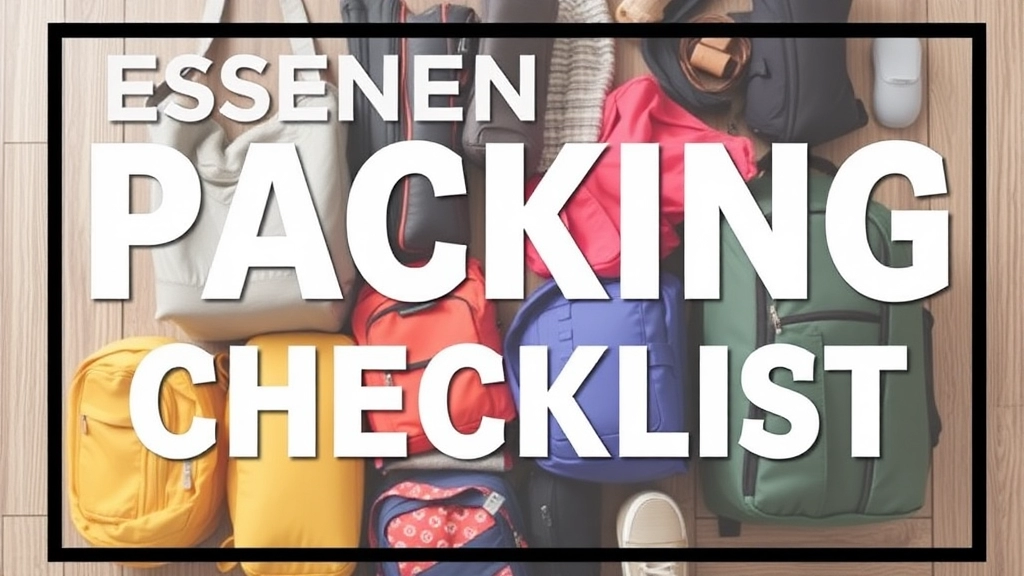
Alright, let’s talk about the Essential Packing Checklist for summer camp.
Ever stressed about forgetting something crucial?
Yeah, we’ve all been there.
So, let’s break it down.
The Basics
First things first, you need the basics.
Without these, you’re toast.
- Clothing: Pack enough for the entire stay. Think comfortable and durable.
- T-shirts
- Shorts
- Long trousers
- Pyjamas
- Underwear
- Socks
- Footwear: Trust me, you don’t want to be caught barefoot.
- Trainers
- Sandals
- Waterproof boots
- Toiletries: Keep it simple but complete.
- Toothbrush and toothpaste
- Shampoo and conditioner
- Soap or body wash
- Hairbrush or comb
- Sunscreen (SPF is your friend)
Specialty Gear
Now, let’s get into the nitty-gritty.
- Bedding: Some camps provide it, some don’t.
- Sleeping bag
- Pillow
- Blanket
- Swim Gear: If there’s water, you’re gonna need this.
- Swimsuit
- Towel
- Goggles
- Outdoor Essentials: This is where most people slip up.
- Insect repellent (mosquitoes are no joke)
- Torch (with extra batteries)
- Reusable water bottle
Health and Safety
Don’t skimp on this.
- Medications: If your kid needs them, pack them.
- Prescriptions
- Over-the-counter stuff like pain relievers
- First Aid Kit: Better safe than sorry.
- Band-aids
- Antiseptic wipes
- Tweezers
Fun Stuff
Let’s not forget the fun.
- Books or Magazines: For downtime.
- Games or Cards: To make friends.
- Journal and Pen: Capture those memories.
Pro Tips
- Label Everything: Seriously, everything.
- Pack in Layers: Weather can be unpredictable.
- Check Camp Guidelines: Some have specific rules.
Real Talk
Remember that time I forgot my torch on a camping trip?
Yeah, not fun.
So, double-check your list.
You don’t want to be that person borrowing stuff left and right.
In short, having the right Essential Packing Checklist can make or break the camp experience.
Emotional Preparation for Campers
Alright, let’s dive into something that often gets overlooked but is super crucialâemotional preparation for campers. If you’re a parent or guardian, you know the drill: excitement, nerves, and maybe a bit of anxiety. So, how do we make sure our kids are emotionally ready for this adventure?
Real Concerns Parents Have
Ever wondered if your child will miss home too much? Or maybe you’re worried they’ll struggle to make friends? These are legit concerns, and you’re not alone. The good news? There are ways to prep your camper emotionally, so they can have a blast and you can have peace of mind.
Start the Conversation Early
First things first, talk to your child about camp. This isn’t a one-and-done chat; keep the conversation going.
- Discuss Expectations: What do they think camp will be like? Address any misconceptions.
- Share Your Own Stories: If you went to camp as a kid, share your experiencesâboth the highs and the lows.
- Visit the Camp Together: If possible, take a trip to the camp beforehand. Familiarity can ease a lot of anxieties.
Build Independence Gradually
You don’t want the first time your child is away from home to be a full week at camp. Start small.
- Sleepovers: Arrange a few sleepovers with friends or family to get them used to being away.
- Day Camps: Enrol them in a day camp to give them a taste of the camp environment without the overnight stay.
Pack Comfort Items
Sometimes, a little piece of home can be a big comfort. Let them pack a favourite stuffed animal, a family photo, or even a small blanket. These items can serve as emotional anchors.
Role-Playing Scenarios
Kids love games, so why not turn this into a fun activity? Role-play different scenarios they might encounter at camp.
- Making New Friends: Practice introducing themselves and starting conversations.
- Handling Homesickness: Discuss what they can do if they start to feel homesick.
- Problem-Solving: Go through some common camp issues and brainstorm solutions together.
For more tips on how to ensure your child has a great camp experience, check out our guide on building friendships at camp.
Guidelines for Communication During Camp
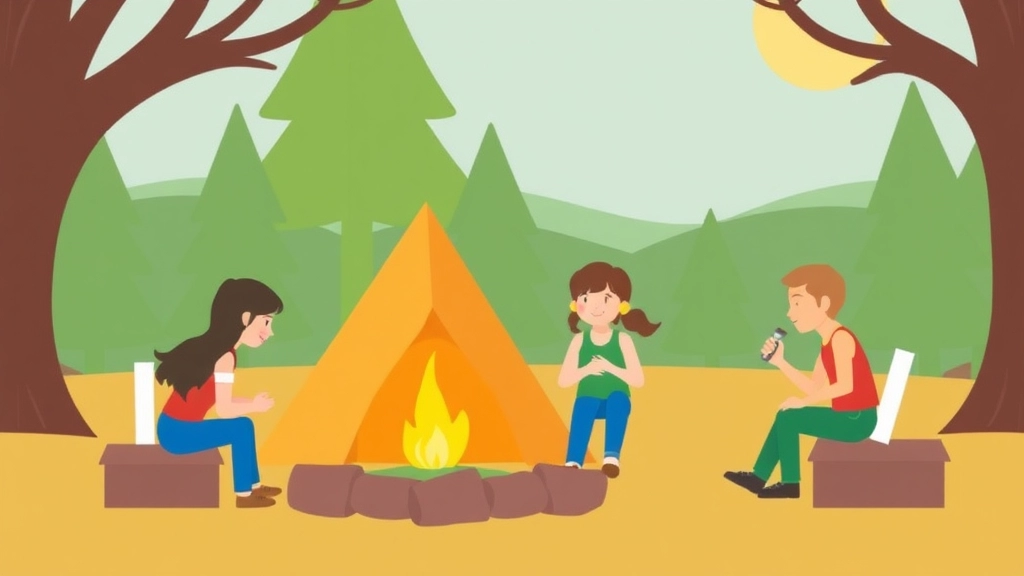
Worried about how to stay in touch with your child while they’re at camp?
You’re not alone.
Communication during camp can be a big concern for parents.
Let’s break it down.
Why Communication Matters
You want peace of mind.
Your child wants to feel connected.
But camps have rules, and you need to respect them.
Types of Communication
Letters and Emails
Most camps allow letters and emails.
It’s old school, but it works.
Phone Calls
Limited but possible.
Check the camp’s policy.
Camp Updates
Many camps send out newsletters or post updates online.
Stay in the loop without overdoing it.
What to Include in Your Letters or Emails
Keep it positive.
Share fun stories from home.
Avoid topics that might make them homesick.
Bullet Points to Keep in Mind:
- Frequency: Don’t bombard them with messages.
- Tone: Keep it light and encouraging.
- Content: Share updates but avoid bad news.
Example Letter
“Hey [Child’s Name],
Hope you’re having a blast!
Guess what? [Pet’s Name] did the funniest thing today…
Can’t wait to hear all about your adventures!
Love, Mum/Dad”
Handling Homesickness
It’s normal.
Encourage them to make friends and try new activities.
Remind them it’s okay to miss home.
Stories from Real Parents
One parent shared:
“My son was homesick during his first camp. We wrote him daily letters. By the second week, he was too busy having fun to write back!”
Final Thoughts
Communication during camp is all about balance.
Stay connected but give them space to grow.
Trust the process.
Engaging Post-Camp Reflections and Memories
Alright, let’s talk about something we all care about â making sure our kids have a blast and actually remember it. How do we capture those golden summer camp moments? How do we make sure they come back with stories and not just mosquito bites? Let’s dive in.
Why Bother with Post-Camp Reflections?
First off, why should we even care about post-camp reflections? Well, here’s the deal. When kids reflect on their experiences, they’re not just recalling memories; they’re learning. They’re understanding what they enjoyed, what they didn’t, and why. This is crucial for their growth. Plus, it helps us as parents to know what worked and what didn’t.
Simple Ways to Capture Memories
So, how do we do this without turning it into a chore? Here are a few straightforward ideas:
- Journals and Scrapbooks: Encourage your kids to keep a journal or scrapbook. They can jot down daily highlights, paste pictures, or even draw. Trust me, they’ll love flipping through it later.
- Photo Diaries: Give them a disposable camera or a basic digital one. Let them capture their favourite moments. When they get back, print the photos and make a photo diary together.
- Story Time: Set aside a family night where everyone shares their favourite camp stories. Make it fun with popcorn and maybe even a little campfire in the backyard.
Make It Interactive
Kids love interactive stuff, right? Here’s how to keep it engaging:
- Video Diaries: If they’re into tech, let them create video diaries. They can talk about their day, interview friends, or even create mini-vlogs.
- Craft Projects: Use camp memories for craft projects. Think about making friendship bracelets, painting rocks, or creating a camp-themed mural.
- Memory Boxes: Have them collect small items that remind them of camp â a cool rock, a leaf, or a camp badge. Store these in a memory box.
Reflective Questions to Ask
Sometimes, kids need a little nudge to get started. Here are some questions to get the ball rolling:
- What was the best part of camp?
- Did you learn something new about yourself?
- Who did you make friends with, and what did you do together?
- Was there anything you didn’t like? Why?
- What would you do differently next time?
Real Stories, Real Connections
Alright, let me share a quick story. Last summer, my niece went to a camp for the first time. She was super shy and nervous. We gave her a disposable camera and a journal. When she came back, she had this amazing scrapbook filled with photos and stories. She even made a video diary where she talked about conquering her fear of heights on the climbing wall. It was incredible to see her confidence grow, all because she took the time to reflect and share.
Post-camp reflections and memories are more than just keepsakes. They’re tools for growth and connection. So, get creative, get involved, and make it fun. Your kids will thank you, and you’ll have a treasure trove of memories to look back on. And hey, if you’ve got any cool ideas or stories, share them with us. Let’s keep this conversation going.
Managing Camper and Staff Schedules
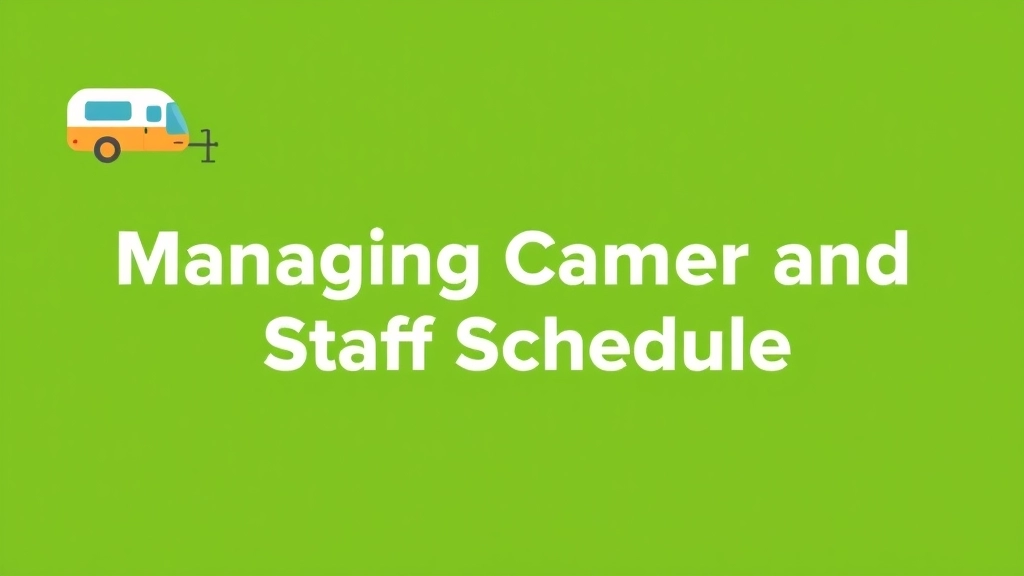
Ever wondered how to keep a summer camp running like a well-oiled machine?
Managing camper and staff schedules is the key.
Let’s break it down.
Why Schedules Matter
We all know that chaos is the enemy of fun.
Without a solid schedule, campers get bored, staff get stressed, and the whole camp vibe goes south.
So, how do you create a schedule that works?
Start with the Basics
First, list out all the activities.
Swimming, hiking, arts and crafts, you name it.
Then, think about the logistics:
- Time slots: When will each activity happen?
- Group sizes: How many kids per activity?
- Staff availability: Who’s leading what?
Pro Tip: Use a spreadsheet. It’s old-school but super effective.
Balancing Fun and Rest
Kids need a mix of action and downtime.
Too much activity, and they’re exhausted.
Too little, and they’re bored.
So, sprinkle in some breaks.
- Morning: High-energy activities like sports.
- Afternoon: Chill time with arts and crafts.
- Evening: Wind down with a campfire or storytime.
Flexibility is Key
Things won’t always go as planned.
Maybe it rains, or a staff member calls in sick.
Have a backup plan.
- Alternative activities: Indoor games if it rains.
- Staff rotation: A pool of staff who can step in.
Real Talk: Stories from the Field
Last summer, we had a day where everything went haywire.
A sudden storm hit, and our outdoor activities were a no-go.
But thanks to our flexible schedule, we switched to indoor games and storytelling.
The kids loved it, and the staff didn’t lose their minds.
Communication is Crucial
Everyone needs to be on the same page.
Use a whiteboard or a camp app to update schedules daily.
Hold quick morning meetings with staff to go over the plan.
Keeping it Fresh
No one likes a repetitive schedule.
Mix things up.
Introduce surprise activities or theme days.
Keeps the campers excited and the staff engaged.
Preparing Camp Staff: Recruitment and Training
So, you’re thinking about preparing camp staff for the summer camp season, huh? Let’s dive right into it because, trust me, this is where the magic happens. If you’re anything like me, you’ve probably got a million questions buzzing around your head. How do I find the right people? How do I make sure they’re ready for anything? And most importantly, how do I ensure they’re going to make this summer unforgettable for the campers?
Recruitment: Finding the Right Fit
First things first, recruitment. This is the backbone of your camp’s success. You need a team that’s not just skilled but also passionate about making a difference.
- Start Early: Don’t wait until the last minute. Begin your recruitment process months in advance. The best talent gets snatched up quickly.
- Clear Job Descriptions: Be specific about what you’re looking for. Outline the roles, responsibilities, and expectations clearly.
- Diverse Platforms: Use multiple channels to find candidates. Social media, job boards, university career centres â cast a wide net.
- Interviews and Screenings: Don’t just rely on resumes. Conduct thorough interviews and background checks. Look for enthusiasm, reliability, and a genuine love for working with kids.
Training: Setting the Stage for Success
Once you’ve got your dream team, it’s time for training. This isn’t just about running through emergency procedures (though that’s crucial too). It’s about creating a cohesive unit ready to tackle any situation.
- Comprehensive Orientation: Kick things off with a detailed orientation. Cover the camp’s mission, values, and daily operations.
- Safety Protocols: Make sure everyone knows the ins and outs of safety procedures. From first aid to emergency evacuations, leave no stone unturned.
- Skill Development: Offer training sessions on specific skills. Whether it’s outdoor survival, arts and crafts, or conflict resolution, make sure your staff is well-rounded.
- Team Building: Foster a sense of camaraderie. Organise team-building activities to strengthen bonds and encourage collaboration.
- Ongoing Support: Training doesn’t stop after orientation. Provide continuous support and resources throughout the camp season. Regular check-ins and feedback sessions can help address any issues early on.
Real Stories: Learning from Experience
Let me share a quick story. Last summer, we had a counsellor named Jess. She was new, a bit nervous, but incredibly enthusiastic. During training, we noticed she had a knack for connecting with kids. We paired her with a seasoned counsellor, Mark, and they became an unstoppable duo. Jess brought fresh ideas, and Mark provided the experience. Together, they created some of the camp’s most memorable moments. This kind of synergy is what you’re aiming for.
Final Thoughts
Recruiting and training camp staff isn’t just a box to tick off your to-do list. It’s an investment in the success of your camp. By starting early, being thorough, and fostering a supportive environment, you’ll build a team that’s ready to make this summer the best one yet.
For more tips on how to create an effective camp experience, check out our Ultimate Guide to Being a Summer Camp Director. Also, don’t miss our Summer Camp Daily Schedule Sample to help you plan the perfect camp itinerary.
Post-Camp Feedback and Improvements
Ever wondered how to make next year’s camp even better?
Yeah, me too.
Post-camp feedback is your golden ticket.
It’s what separates the “meh” camps from the “wow” camps.
Why Bother with Feedback?
- Real Talk: Direct insight from campers and staff.
- Spot Trends: Uncover recurring issues or highlights.
- Build Trust: Shows you care about their experience.
How to Collect Feedback
- Surveys: Quick, easy, and effective.
- Use tools like Google Forms or SurveyMonkey.
- Keep it short but impactful.
- Ask about specific activities, facilities, and overall experience.
- One-on-One Chats: More personal.
- Sit down with campers and staff.
- Ask open-ended questions.
- Listen more than you talk.
- Suggestion Boxes: Old school but gold.
- Anonymous feedback.
- Place them in common areas.
Key Questions to Ask
- What was your favourite part of camp?
- What could we improve next year?
- Any issues you faced?
- Would you recommend this camp to a friend?
Acting on Feedback
- Quick Wins: Fix the easy stuff first.
- Big Changes: Plan for next year.
- Communicate: Let everyone know you’ve listened and acted.
Real-Life Example
Last year, we got feedback that the food options were limited.
Guess what?
We revamped the menu.
Added more variety.
This year, the food reviews were stellar.
Feedback isn’t just a formality.
It’s your roadmap to a better camp.
And trust me, when campers see their suggestions in action, they’ll be more excited to come back.
So, let’s make next year’s camp the best one yet.
Collect that feedback.
Make those improvements.
If you need inspiration, check out our guide to top summer camps in Dayton, Ohio or get some fun game ideas to keep the campers engaged.
Ready to rock next summer?
Let’s do it!
FAQs: Summer Camp Planning Checklist
Why is early registration important for summer camps?
Early registration is crucial because it secures your spot in top camps, often at a discounted rate. Camps fill up quickly, and registering early gives you peace of mind as summer approaches.
What if my child doesn’t enjoy the camp?
Many camps offer flexible policies that include refunds or the option to transfer to another camp. It’s always a good idea to check these policies before registering.
What should I pack for summer camp?
Having an Essential Packing Checklist is key. Basics include clothing, footwear, and toiletries. Specialty gear like bedding and swim gear, as well as health and safety items such as medications and a first aid kit, are also important.
How can I stay in touch with my child during camp?
Most camps allow communication through letters and emails, and some even permit limited phone calls. Camps may also provide updates via newsletters or online posts to keep you in the loop.
What should I include in letters or emails to my child?
Keep your messages positive and encouraging. Share fun stories from home and avoid topics that might make your child homesick.
How do camps manage camper and staff schedules?
Effective schedule management involves listing all activities, assigning time slots, and considering group sizes and staff availability. A good mix of high-energy and downtime activities, along with backup plans for unforeseen circumstances, is essential.
What if the weather disrupts the camp schedule?
Flexibility is key. Have alternative activities like indoor games ready in case of bad weather. Staff rotation plans can also help manage any sudden changes.
How can I make sure my child has everything they need for camp?
Double-check your Essential Packing Checklist and ensure everything is labeled. Packing in layers and checking camp-specific guidelines can also help you prepare better.
How often should I communicate with my child at camp?
Balance is important. Avoid bombarding them with messages. Keep the tone light and encouraging, and share updates without overwhelming them.
What if my child gets homesick at camp?
Homesickness is normal. Encourage your child to make friends and try new activities. Remind them that it’s okay to miss home, but also to enjoy the camp experience.
How can I ensure the camp schedule stays engaging for my child?
Keep the schedule fresh by mixing in surprise activities or theme days. This keeps both campers and staff engaged and excited.
Any tips for making the camp experience smoother?
Start planning early, create a shortlist of camps, check reviews, and contact camps directly to understand their deadlines and policies. Label everything, pack in layers, and always have a backup plan.
References
-
Early Bird Gets the Worm: Benefits of Early Registration
-
The Ultimate Summer Camp Packing List
-
Staying in Touch with Your Kids at Camp

